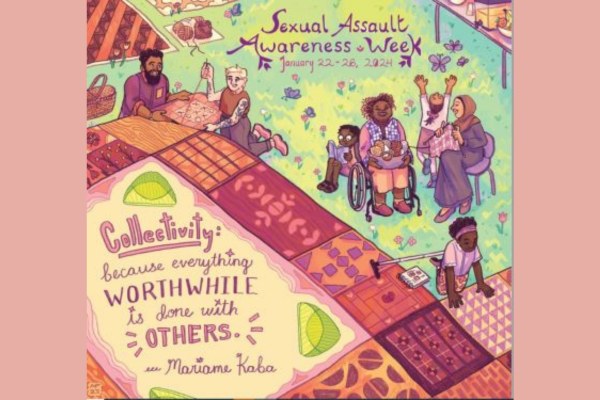Now that we’re all getting back into the groove of the semester, for some of us, the workload and the deadlines may be beginning to pile up. The added stress of the current state of the pandemic may also be taking more of a toll on our mental health these days. As many may already know, access to mental health services is especially difficult during this time, and many cases of mental health issues may end up going unnoticed. Although this is an unfortunate reality of the pandemic, it is not to say that there is nothing we can do to help out friends and loved ones who we suspect may be struggling with their mental health. The following tips, pulled directly from the Supporting a Friend workshop program, aim to help individuals such as yourself, identify and approach friends or family that you suspect to be having an especially difficult time. A simple way to remember the steps to Supporting a Friend is to keep in mind the four R’s: Recognize, Respond, Refer and Reflect.
Recognize
This step focuses on identifying symptoms that may potentially indicate mental health struggles. While physical indicators such as a tired appearance, weight change and changes in personal hygiene are all common signs of poor mental health, behavioural indicators such as changes in social interactions, changes in substance use patterns and isolation from friends and family are also important signs to look for.
Respond
Next, it is important to approach your friend or loved one coming from a place of empathy. You can point out that you have noticed changes in their behaviour and offer your love and support. Always make sure to reassure them that you are there to listen! Most importantly, let them know that you are a safe space, free of any judgment.
Refer
Perhaps the most important step is to ask the individual how they can be supported. Always make sure to provide them with resources and extra supports that they can reach out to. However, do not pressure the individual to reach out to these resources if they are not ready. Continue to offer them support and let them know where they can go if they need help. In some cases, the individual may just need to get something off their chest. Regardless, make sure they have easy access to a list of supports.
Reflect
Finally, it is important for you to reflect on how the situation affects you. While you may feel the need to support your friend no matter what, it is also imperative that you know your limits when it comes to your own mental health. Remember, you cannot help someone before you help yourself first. The wellness of others does not fall solely on you. There are trained professionals who are always available to help! It may also be useful to fill out a care report form regarding your peer as this allows the Office of Student Affairs to monitor the situation more closely.
While it is definitely a difficult time for most of us, given we are all experiencing some form of isolation, remember to reach out and stay connected with your loved ones. A simple check-in can spark a conversation about mental health issues that would’ve otherwise been missed. Also, do not hesitate to reach out for help, whether it be for advice on how to help a friend or how to help yourself. Carleton University offers many programs and services geared toward mental health. Refer to the list of resources provided for more information!
Resources:
- List of mental health resources
- Filling out a Care Report
- More information regarding Supporting a Friend workshops
Recent Quote the Raven Posts
Read the latest from our student Bloggers











 Ask Me
Ask Me